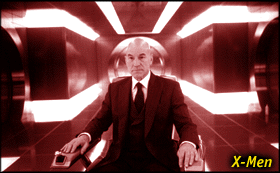![[Sidebar]](/standard/image/sidebar.gif)
July 14 - 21, 2000
![[Movie Reviews]](/standard/image/headers/movie_reviews_header.gif)
| reviews & features | by movie | by theater | film specials | hot links |
|
|
|
No brand X
The blockbuster evolves
by Peter Keough

"There aren't many people who understand what people like us are going through," says Logan (Hugh Jackman), a/k/a Wolverine, as he consoles the waif-like Rogue (Anna Paquin). Well, yes and no. True, not many people have 18-inch claws protruding from their knuckles and must shun other people to avoid draining their life force. On the other hand, adolescents of all ages have always understood what the mutants of the Marvel comic book X-Men have been going through since it first started publication, in 1963. After all, the onset of symptoms at puberty render one monstrous, freakish, ostracized -- and just like everyone else.
These fans no doubt worried that the big studio version of their anti-heroes would be just like every other summer blockbuster -- noisy, gaudy, and inane. This film, however, is no Batman and Robin. It's even better than Tim Burton's original Batman. X-Men is the best movie made from a comic book and the notable exception to a summer of forgettable Hollywood releases.
Not that it doesn't take some suspension of disbelief to get into the film's implausible, trading-card nonsense and digest the detail and jargon of a four-decade-old back story. But director Bryan Singer turns these handicaps into advantages, transforming the cartoonish pratfalls and angst into a kinetic, witty, ultimately moving allegory about intolerance, evolution, identity, proper superhero style, and the other questions that bother the adolescent in us all.
Any comic-book movie that opens with the Holocaust must take itself seriously. In a camp in Poland in 1944, a young Jew, Erik Lehnsherr (Ian McKellen), the future Magneto, is being separated from his parents. It takes a dozen guards to do so, since the boy has suddenly discovered powers of magnetic attraction that rip the barbed-wire gates apart. This early introduction to genocidal hatred steels Magneto for a future of intolerance for his kind -- not Jews, but mutants, who have inexplicably proliferated in an evolutionary surge.
Grown bitter, ruthless, and vastly powerful, Magneto forms a brotherhood of mutants to defeat the normal oppressors. They are hybrid prodigies with names like perfumes or men's magazines: the troglodytic Sabretooth (Tyler Mane), the tongue-flicking Toad (Ray Park), the shape-shifting Mystique (Rebecca Romijn-Stamos). When Senator Robert Jefferson Kelly (Bruce Davison) unleashes his McCarthyite campaign to register mutants, Magneto knows it's time to make his move. Since he can't beat the humans, he plans to make them join him -- through a device that spreads mutations and has creepy connotations of Christian sacrifice and the AIDS virus.
Meanwhile, Magneto's former friend Professor Charles Francis Xavier (Patrick Stewart), a wheelchair-bound telepath, has set up his own mutant force at the tony Xavier School for Gifted Youngsters, which upstairs is a manse-like academy for nerdy mutant teens (like those in the audience) and downstairs houses a fortress full of high-tech Tinkertoys that would make Bruce Wayne envious. The Xavier School's star pupils -- Cyclops (James Marsden), whose eyes emit a devastating ray; Storm (a perfect Halle Berry), who can summon wind and lightning; and Jean Grey (Famke Janssen), Professor Xavier's telepathic protégée (apparently, the psychic mutants don't warrant cheesy monikers) -- get to wear neat leather outfits and fight for an ungrateful human race.
Abetted by newcomer Wolverine (superb in a terrific cast -- look for the smoldering Australian Jackman to be the next Russell Crowe), the X-Men set out to rescue the kidnapped Rogue (she's mutant as ultimate female victim, one of the film's few sexist notes) and face off against Magneto and company in a showdown at the Statue of Liberty that combines the surreal absurdity of North by Northwest's Mount Rushmore sequence with the exhilarating Hong Kong-style acrobatics and state-of-the-art f/x of The Matrix. This is just the culmination, though, of a tautly scripted (despite having eight writers, five non-credited), visually dense narrative. Singer (The Usual Suspects, Apt Pupil) knows how to elicit unexpected performances and utilize every inch of the screen. The editing is predictably breakneck, but what's most exciting are the abrupt, outlandish, comic-book images: a kid on the beach playing with a jellyfish just before a surprising metamorphosis of Senator Kelly; Magneto crossing a void, plates of metal flying up from nothingness to form a bridge at his feet. Singer uses these images to compress the complications of plot and the echoes of meaning into haunting conceits.
Admirable in its inclusiveness, X-Men has a little trouble with resolution. The episodic ending calls out a little too blatantly for sequels and spinoffs; it's more X Files than X-Men. There could be worse things, though, than an X-Men II, or even an X-Men X. The species of the summer blockbuster, long stagnant, has taken an evolutionary leap forward.